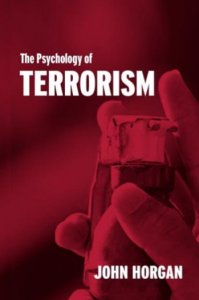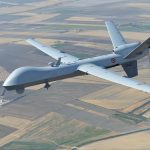Book- The Psychology of Terrorism
Author- John Horgan
Publisher- Routledge Taylor and Francis
ISBN- 0-7146-5262-8 (hdbk.) 0-7146-8239-X (pbk.)

The author presents a critical view of the already known facts and understanding of terrorism and its psychology. The author has taken various events into consideration like the 9/11 attacks, 1992 Algeria’s conflict, events of the war in Bosnia, etc. The author though first establishes what terrorism actually is. Terrorism has no proper definition and is a debatable subject. It involves the use of or threat of use of violence as a means of attempting to achieve some sort of effect within a political context. Terrorism is also referred to as a form of sophisticated psychological warfare. From a psychological perspective, an important characteristic even in the simplest analysis distinguishing terrorism from other kinds of crime is the political dimension to the terrorist behavior. He also talks about Schmid and how he proposed that a narrower definition may help us more than that of a broader one, open to all interpretations by many. He recommends that we should seek to always define terrorism in terms of the methods used, allowing no room for war crimes. He offers a potential exit from the problem of deciding the acts of righteousness. (P.17)
The author even looked at how the 9/11 attacks resulted in the death of almost 3000 people but the long term reward for those who planned it was the humiliation of the American Government and psychological arousal for the greater population. Since, the attack and the confused local, national, and international responses the capacity and potency of Al Qaeda have been severely overestimated.
The author goes on to talk about how a terrorist attack more often than not has a personal level emphasis on the scale of destruction and property damage, the media coverage, and reports also are also dominated by the personal vulnerability. Here, we need to look beyond the media accounts for a systematic and an informed understanding of it, because it is a complex subject and cannot be bound by certain attributes or fully explained.
The author also reflects how the focus of researchers is not just an issue of describing terrorism but also one of substantial confusion with the issue of identification of the terrorist which is ‘what is a terrorist’. The author also says how a psychological approach to terrorism may seem like profiling like that of fictional characters,(p.28) but psychological profiles of terrorists help in some identification and background. A simple bias can affect our understanding of the terrorist in several ways and can lead to a distorted view of both the terrorist and the process of terrorism more broadly. There is also limited primary first-hand research in this field as the research done by the government and their intelligence agencies do not permit access to their records because of sensitive information.
Several attempts to understand terrorism and terrorist organizations have been made but it is hard to crack through the thick shells and the non-responsive behavior of the terrorists. Some methods and approaches were categorized to emphasize the process which includes- (i) frustration-aggression (ii) narcissism (iii) psychodynamic influences. (p.49) Even after a lot of research, researchers like Silke argue that terrorists are essentially normal individuals. (p.54) It is difficult to distinguish between a terrorist and another individual because of a lack of evidence showing abnormality. It is also difficult to ascertain as to why an individual becomes a terrorist, despite the frustration-aggression analysis and the personality concept it is difficult to give an affirmed answer.
When we study and try to understand a terrorist it is not necessary that getting close to understanding one has handed us an answer for all the others because every individual has different reasons and the logic and understanding applied to one may not answer the questions to the other. According to the author, it is also important to address a few questions to get some understanding- Why do people want to become involved in a group that engages in terrorist violence? How do people become involved? What role or tasks do they fulfill once a member? How and why does a person move within and through the terrorist organization? How and why does the individual both ‘assimilate’ the shared values and norms of the group, and how and why he then accommodates to engagement qualities not previously considered or expected prior to membership? How and why do the members commit specific acts of violence? How and why they affect other members? and How and why do they ultimately want to or have to disengage from terrorist activities, move into other non-violent but relevant support activities or leave the organization altogether?(p.71)
There are several root causes that are associated with the emergence of terrorism which include lack of democracy, civil liberties and the rule of law, failed or weak states, rapid modernization, extremist ideologies of a secular or religious nature, historical antecedents of political violence, civil wars, revolutions, dictatorships or occupation, hegemony and inequality of power, illegitimate or corrupt governments, powerful external actors upholding illegitimate governments, repression by foreign occupation or by colonial powers, the experience of discrimination on the basis of ethnic or religious origins, failure or unwillingness by the state to integrate dissident groups or emerging social classes, experience of social injustice, presence of charismatic ideological leaders and triggering events. (p.72)
Becoming a terrorist is not easy but remaining and then leaving it is no swift process too. Disengaging oneself from terrorism is not an easy procedure it involves the implications of leaving the organization, psychological influences and organisational issues.















